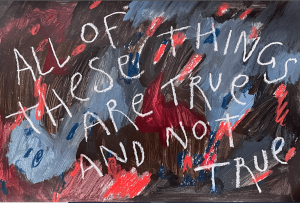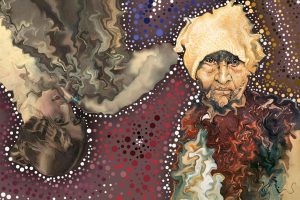In Defence of Caring Too Much
by Innayat Brar | February 22, 2024
The muffled din of a crowded college bar on a Saturday night. Liquid courage invites new-found proximity to strangers, conversations struck like matches with people you don’t typically see in the sobering light of day. At the forefront of the scene is a mouth agape, eyebrows and nostrils carving the face into an inscription of bewilderment. My shock is statuesque after the man sitting in front of me utters: ‘I’m apolitical.’
A beat.
‘I’m not that interested, and I just don’t really see the point to any of it, to be honest.’ As the hint of a smirk flickers across his features, I feel my own immobilised by a rare surge of social insecurity. Somewhere in the space between his two statements, my conviction in ideology, in justice, in a meaningful beyondness, teeters before a precipice of uncertainty.
All that I hold sacred is being apprehended under the clinical light of scrutiny. My political consciousness seems to be an anachronism, a careworn, cobwebbed artefact that our culture has deposited in the basement of the past as it seeks new tokens of worship. Argument swiftly supplants flirting; I desperately attempt to put forth a bid for relevance while he takes a second sip from his third San Miguel.
This tableau is perhaps the closest thing that I’ve experienced to religious doubt. Like a phantom pain, I’m periodically reminded of my experience with ideological vertigo months after the fact. To reckon at university with the reality of not only political difference, but rather indifference, has made me feel naive and silly. All of a sudden, I’m a child who incorrectly used a new slang word to fit in with my cooler peers; I’m an idealist who is yet to mature into the principled nonchalance of the cynics.
The dominant religion which pervades my social milieu is the cult of apathy. In trying to impose a unified identity upon a culture defined by diverse systems of belief, the only commonality that seemed apparent to me was people’s proclivity to simply not be that interested; to just not really see the point to any of it. Of course, lip service is paid to attractive causes, but the naked fire of my adolescence – when my friends and I were unassailable in our desire for difference-making – seems to have been extinguished in adulthood. This apathy is less indicative of ignorance, I think, and more the unfortunate by-product of a generation that has grown up with tragedy and conflict. Even as I write this from the safety of my dorm room, knowing that I’ll be closer to stepping foot on the moon rather than the battlefield, I cannot deny the pessimism wrought by extensive and oft-ubiquitous media coverage of wars, famines, and genocides around the world. In many ways, it is a very protective impulse to compartmentalise the reality that unimaginable suffering continues to persist as a way of foreclosing feelings of helplessness, futility, and despair. It is ironic that the main way in which collectivism seems to any extent be currently mobilised is through the cult of apathy. The only thing which merits belief is nothing itself.
Believing in nothing is actually more complicated than people give it credit for. It requires the careful assembling and veneration of ideologies, and a hierarchical structuring in which respect is earned through the relinquishing of care. The denial of an affective response to the challenges presented around us, and the rallying shrug of ‘I’m apolitical’, are the chief commandments of this new religion. However, to be negatively defined (apolitical, unaffected) is to exist responsively. As much as cynicism advertises transcendence, it is always dependent, in a dynamic see-saw of levied and recanted forces, upon the associated ideology it is denying. I hear about our society being post-capitalist, our humour being post-ironic, our humanity post…relevant? Despite being promised nirvana, my supplication to cynicism propelled me into a purgatory of post. How could I feel untethered to political engagement when the outcomes of elections govern whether my parents can make enough money to provide for their children, or whether innocent lives remain untaken by military conquest? Post instantiates privilege, and my lived reality means that I cannot afford the price of cynicism.
These emotional responses are not indexed in a spreadsheet. I struggle to impress the rationality of my persisting care. I cower before the cool rhetoric of those who believe social unconsciousness is the natural progression for our generation.
But isn’t care the greatest social mobiliser of all? Maybe my optimism is seen as crass naivety to those hardened by the currents of a disappointing political culture. But by withdrawing our commitment towards generative social engagement, we’re not divesting politics of its power; only ourselves of our own. As a coping mechanism, I can sympathise with the cult of apathy, the way one does to a nicotine-reliant finalist. However, to be cynical is to consent to the neutering of one’s own impact, and to deny the rights that, for anyone who isn’t a straight white male, were borne from the historic advocacy and suffering of minoritized people: people who dared to care for more.
Democracy is a privilege that has only recently and partially been extended to women and people of colour, and is constantly being contested, fought for, and died for. To hide behind the negation of a in apolitical is to offset oneself against a history of sacrifice for progress. Perhaps the closest religious analogy for the cynic can be found in the story of the prodigal son: one who rejects the rights they’ve inherited from a genealogy of difference-making. One who loses their way, and themselves, to the amnesia of social unconsciousness. The only way the cynic can transcend themselves, be post the religion of anti-belief, is by reclaiming the duty to care that has been earned for them. It’s no paradise, but at least something worth fighting for is better than nothing.∎
Words by Innayat Brar.




![Coleridge Called from Venus [Last Night's Dream] 10876541795_73de41f92c_o](https://isismagazine.org.uk/wp-content/uploads/2015/03/10876541795_73de41f92c_o-300x200.jpg)